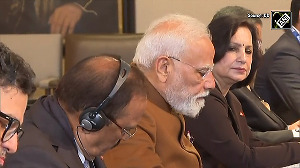 Prompted by the Reserve Bank of India's increase in the key rate, the repo, banks have raised interest rates by 325-350 basis points.
Prompted by the Reserve Bank of India's increase in the key rate, the repo, banks have raised interest rates by 325-350 basis points.
However, if one sees the profit and loss and balance sheet statements of Indian companies, they have not been under that much pressure due to the interest rise.
In an analysis of 681 companies, the interest cost as a percentage of total debt (over Rs 50 crore or Rs 500 million each) for these companies had remained below six per cent in the past five years.
The average finance cost increased marginally in 2010-11 by 26 basis points to 5.67 per cent, considerably lower than the policy rate of eight per cent (up 325 bps in two years) and an average prime lending rate of 14.3 per cent for banks (up 350 bps).
Analysts attribute this low finance cost of Indian companies to the low cost of foreign borrowing and capitalisation of interest costs on borrowing for new unfinished projects.
R Shankar Raman, chief financial officer, Larsen & Toubro Ltd, said borrowing from the global market, where interest rates are ruling low on the back of huge liquidity and use of derivatives, helped to keep interest costs low.
The average cost is significantly lower for companies with foreign borrowing.
Also, many companies take the impact of the exchange-related movement in foreign currency loans on the balance sheet, an aggressive accounting treatment, says analysts at Kotak Securities.
The low overall cost of borrowings suggests companies have low financial hedges for borrowings abroad and are relying on natural business hedges or stable exchange rates.
The interest rate for financial year 2011 for companies having significant foreign borrowing and those which capitalised interest for unfinished projects have been quite low.
The foreign currency borrowings of big companies accounted for between 25 and 80 per cent of the total debt in financial year 2011.
For example, foreign currency borrowing accounts for 78 per cent of the total debt of Rs 84,106 crore (Rs 841.06 billion) for Reliance Industries and 89 per cent of Bharti Airtel's total debt of Rs 53,234 crore (Rs 532.34 billion).
State Bank of India chairman Pratip Chaudhuri said only large companies have been able to keep their interest cost in check, through international fund raising and using interest rate derivatives (a financial product giving protection against fluctuation in the interest rate).
Rajesh
Some of them (strong and better rated companies) use short-term debt, the interest rate on which is low, than long-term finance, and roll it over a few cycles.
This way, they are able to ride through a phase where rising rates put pressure on finances.
Taking the benefit of a very low interest rate regime in major financial markets, they have raised funds through foreign currency bonds and external commercial borrowing.
Even after hedging for currency and interest rate risks for such foreign borrowing, the cost would be less than what an AAA-rated company would bear for funds in the domestic market, he added.
While this is true of most companies, some companies or sectors are passing through tough times, where leverage could be high.
Those entities have not much choice and their financing costs may be on the higher side, he said. Take telecom companies.
Many raised short-term funds (huge amounts) to pay for spectrum and licence fees. That raised their leverage.
Now, they are refinancing these funds with long-term money raised through external commercial borrowing.
The capitalisation of borrowing costs is suspended in the period during which the active development is delayed due to other than temporary interruption.
In our sample of 681 companies, the capitalisation of interest accounted for a little over 25 per cent of the total interest costs.
The capitalisation of interest was 19.7 per cent of the total interest cost of Reliance Industries, 170 per cent for Bharti Airtel and 86 per cent for NTPC.











